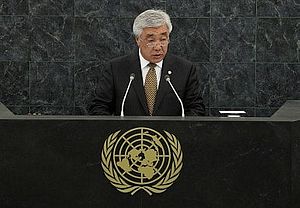When the United Nations was first created – and for decades after – Central Asia was low on the global agenda. The region was widely regarded as remote and poor, its territory largely part of the much bigger Soviet Union with little connection to the world politics and economy. Given such history, it is perhaps not a surprise that no member state from Central Asia has ever sat on the Security Council.
But as we approach the 70th anniversary of the UN, it is time to correct this oversight. Central Asia is no longer on the global periphery, but is now home to new nations and new opportunities, including rich natural resources. It links – as it did through the ancient Silk Road – the economic powerhouses of the west with the new engines of global growth to the east and south. Trade and ideas are flowing across region.
There are few places in the region that better symbolise this remarkable transformation than Kazakhstan. Since independence in 1991, we have forged a modern country and a successful economy, which is now among the top 50 in the world. We are a major exporter of energy and raw materials to our many partners, have a fast-growing hi-tech manufacturing base and highly educated workforce.
We are also proud to have built a tolerant, peaceful society where people of many different backgrounds share in our country’s well-being. This is a difficult challenge in a region where deep ethnic divisions are far too common and violent extremism has a dangerous foothold.
Our experience – and the diverse make-up of our population – has helped shape our approach to the world. We have worked tirelessly to bring countries together and promote intercultural dialogue. In the triennial Congress of the Leaders of World and Traditional Religions in Astana, we have established a high-level forum to prevent divisions and enhance co-operation between the faiths.
Kazakhstan’s place in the world has also been defined by our early decision to give up the world’s fourth largest nuclear arsenal and close the Semipalatinsk nuclear test site. It has enabled us to campaign with moral authority for nuclear disarmament and non-proliferation. Our country was instrumental in establishing a nuclear weapons free -zone, with the support of all the major nuclear powers, in Central Asia.
The result is that we are friendly with all our neighbours and have strong relations with Russia and the US, China and Europe as well as a wide range of developing nations. These links have been strengthened in recent years as Kazakhstan has opened new embassies in Africa and Latin America and developed formal links with organisations such as the African Union and the CARICOM.
The relationships we have built and our reputation as a trusted member of the international community have seen our hospitality used to help find solutions to some of the world’s most difficult problems. Kazakhstan hosted two rounds of the now successful talks to find agreement over Iran’s nuclear programme. In the last few weeks, too, the formal agreement has been signed for us to host a unique institution – the International Atomic Energy Agency’s firs ever Low Enriched Uranium Bank. This will enable countries to develop their civil nuclear power without weakening the non-proliferation regime.
As our economy has grown, we have also recognised our duty to take on a bigger global responsibility. Our forces now participate in UN peacekeeping missions while the expected launch of KazAid overseas development assistance agency will give us a formal body to co-ordinate and expand our development efforts. We already, for example, provide significant bilateral help to Afghanistan and support international efforts in that and other countries in our region.
It is against the background of the growing importance of Central Asia and our country’s increasing engagement within the region and the wider world that Kazakhstan decided to put its name forward as a candidate for one of the five non-permanent seats on the Security Council for 2017-2018. We believe our unique history together with our track record of support for the United Nations will enable our country to make a valuable contribution to its work.
This experience is reflected in the four pillars of food, water, energy and nuclear security which Kazakhstan has set out as priorities for our bid for the UNSC. In each important area, we believe we can speak with authority and help the world make progress towards fair and lasting solutions.
2017 will be the 25th anniversary of Kazakhstan’s full membership in the United Nations. From the beginning, we have shown ourselves committed supporters of the UN’s work and values. We hope that we will be given the chance to expand our contribution for peace and prosperity.
The author is Kazakhstan’s Minister of Foreign Affairs.

































